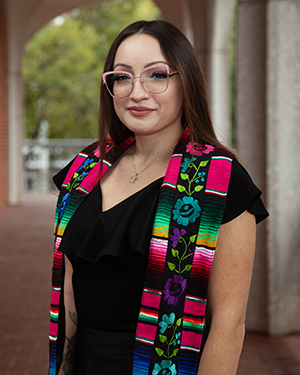Honors student’s project reveals past Chicano activism at SAC
December 1, 2022
A San Antonio College student’s class project turned into a deep dive into past student activism on campus – and likely helped her earn admission to UT Austin.
When Honors Academy student Nati Roman took an Intro to Mexican-American Studies class at SAC, she learned about the Chicano movement of the late 1960s and 1970s, a nationwide push for civil rights and empowerment for Americans of Mexican descent.
She began to wonder: what was going on at SAC back then?
“SAC was around during the civil rights movement and the Chicano movement. I knew there had to have been activity,” Roman said.
 Roman found little mention of SAC in accounts of the local movement, so she began conducting her own research. In addition to sources including The Ranger student newspaper, she tracked down students from the early 1970s and interviewed them to collect oral histories of their experiences at SAC.
Roman found little mention of SAC in accounts of the local movement, so she began conducting her own research. In addition to sources including The Ranger student newspaper, she tracked down students from the early 1970s and interviewed them to collect oral histories of their experiences at SAC.
She also interviewed Alamo Colleges District Chancellor Mike Flores about his father Ruben, who became a dean at SAC in 1986 and served the campus for 28 years. The elder Flores, a pioneering advocate for Mexican-Americans, played a role in bringing more Latinx faculty to SAC.
Roman discovered that politically active student groups were on campus and that several SAC faculty members advocated for classes that were more culturally relevant to students.
She learned that the first Mexican American history class at SAC was offered in 1970 by history professor Johnny McCain, an advocate for Mexican American students on campus (one SAC publication announced the news with the headline “’Gringo’ teaches Mexican-American history.”)
She found and interviewed Jose Luis Rodriguez, a former SAC student who produced an underground Chicano newspaper on campus. Rodriguez later went on to publish The Chicano Times, which was one of the leading local Latino newspapers in the 1970s and eventually circulated throughout the state from the city’s West Side.
“This is what we call history from the bottom up, by looking at everyday people and highlighting how their lives matter in making history,” said Dr. Marianne Bueno, co-coordinator of SAC’s history program, coordinator of Mexican American studies and Roman’s professor in her Mexican American studies class. “It’s not just politicians, civic leaders, business leaders and military leaders who make history. It’s everyday people who also make history and Nati is especially attuned to their experiences.”
Roman’s original research also adds to the historical record, Bueno said.
“Nati’s research not only fills a gap in San Antonio College history, but it fills a gap in San Antonio’s role in the larger Chicano movement,” Bueno said. “She’s putting SAC in conversation with the larger Chicano movement that was happening here regionally and in Texas, but also nationally across the country.”
Roman presented her findings online, adding historical photos, newspaper clips and other graphics to tell the story in a visually appealing way.
Her own activism as a SAC student drove her interest in the project.
Soon after enrolling, Roman joined Somos La Gente, a Chicanx, Latinx and Indigenous student group. She found a community of like-minded students and became active in efforts to remove the Ranger as the SAC mascot. She was the group’s president when the campaign to change the mascot succeeded.
While at SAC, Roman was part of the SAC Honors Academy, a free program that provides opportunity, resources and support to high-achieving students. She graduated from SAC in May as an honors student and a distinguished graduate in Mexican American studies.
She included the project in her successful application to UT Austin, where she’s currently a junior majoring in Mexican American studies. She’s also studying digital humanities to present history in a way that’s accessible to modern audiences.
For Roman, the project isn’t done yet. She’s continuing to develop it at UT and plans to pursue graduate studies to help younger generations understand the past.
“I’m really interested in the way that history is presented and what kind of history is presented,” Roman said. “My goal is to keep doing research on my community, telling under-told stories. My end goal is to create interesting, engaging, interactive websites for other people to learn some of this history.”
-SAC-
